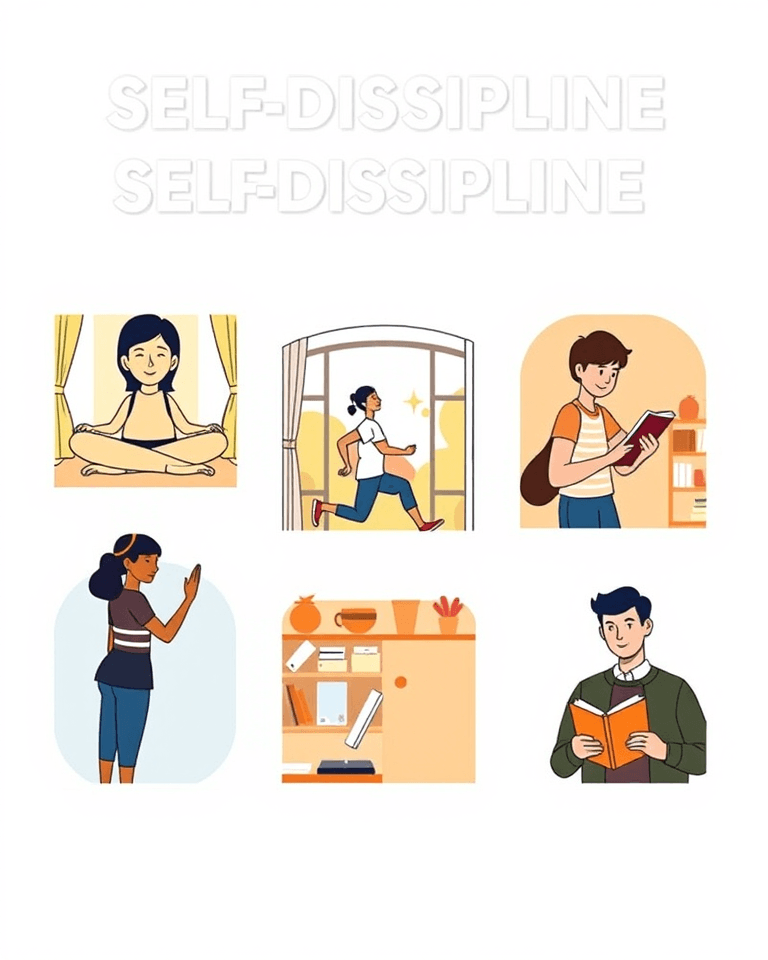Self-discipline is often hailed as the cornerstone of success, yet many of the discussions surrounding it focus on well-trodden paths like goal-setting and time management. While these are undoubtedly important, there exists a realm of less-discussed habits that can significantly amplify your self-control and propel you toward achieving your objectives. This article delves into five such unconventional yet highly effective practices.
The Power of Micro-Habit Stacking
Forget the drastic overhauls; small habit stacking is where the real magic begins. This strategy involves initiating minuscule, easily achievable habits and gradually layering them to create a powerful, cumulative effect over time. Instead of attempting to transform your entire routine overnight, start with micro-habits—actions so small that they’re almost impossible to resist. For instance, if you aim to exercise more, begin with a single push-up daily, then increase it gradually. This approach avoids the intimidation of major change and builds momentum.
The key is to build on these tiny actions. Once the first habit becomes second nature, you can stack another on top. This method harnesses the power of consistent small wins to build a strong foundation for self-discipline.
Why it Works
- Reduced Resistance: Starting small eliminates the usual resistance we have towards big changes.
- Builds Momentum: Each small victory fuels your motivation.
- Sustainable Progress: Gradual stacking leads to lasting, sustainable habits.
Harnessing Visualization Techniques
Visualization is more than just daydreaming; it’s a powerful tool to reinforce positive patterns in your subconscious mind. By creating vivid mental images of yourself achieving goals and demonstrating disciplined behavior, you align your thoughts and actions. This practice is frequently used by elite athletes to boost their performance. They visualize successful races, flawless routines, and maintaining composure under pressure.
You can apply this principle to any area of your life. If you aim to improve your work ethic, visualize yourself completing tasks efficiently and staying focused. This mental rehearsal prepares your mind for the desired outcome, reducing the likelihood of falling back into undisciplined habits.
How to Use Visualization
- Create Detailed Scenarios: Visualize every step of achieving your goal, engaging all senses.
- Practice Regularly: Make visualization a daily habit to strengthen its effect.
- Feel the Success: Focus on the positive emotions of reaching your desired outcome, making the experience feel real.
Mindfulness and Self-Awareness
Cultivating mindfulness and self-awareness can significantly enhance your self-discipline by developing a keen understanding of your thoughts, emotions, and triggers. This awareness allows you to recognize the patterns that lead to undisciplined behavior, giving you the power to intervene and make more conscious choices. Practicing mindfulness meditation is a very effective way to hone your self-awareness.
By observing your inner landscape, you can identify impulsive urges, distracting thoughts, and unproductive habits. This awareness allows you to respond thoughtfully, rather than react impulsively. Over time, mindfulness creates a space between stimulus and response, enabling you to consciously choose actions that support your goals.
Tips for Cultivating Mindfulness
- Start with Meditation: Begin with short sessions of mindfulness meditation to observe your thoughts and feelings without judgment.
- Pay Attention to Triggers: Identify the situations, people, or emotions that lead to undisciplined behavior.
- Practice Non-Judgment: Observe your thoughts and emotions without criticizing yourself; simply acknowledge and let them pass.
Embrace the Art of Oosouji
Rooted in Japanese tradition, Oosouji, or the “great cleaning,” extends beyond physical tidiness to cultivate mental clarity and discipline. This practice involves thoroughly cleaning your living and working spaces, not just to remove clutter, but also to create an environment that supports your goals. A clean and organized space promotes focus, reduces distractions, and fosters a sense of control.
Oosouji is more than just a cleaning ritual; it is a form of mindfulness that connects your external environment with your internal state. When your surroundings are orderly, your mind is more likely to follow suit. It’s a practice that helps remove the mental clutter that inhibits self-discipline.
Incorporating Oosouji
- Schedule Regular Deep Cleans: Designate specific times for thorough cleaning sessions, not just surface-level tidying.
- Declutter Ruthlessly: Get rid of items you don’t need or use to reduce both physical and mental clutter.
- Organize Intentionally: Arrange your space to support your daily activities and goals, promoting efficiency and focus.
The Power of Accepting Responsibility
Accepting responsibility is a vital, yet often understated, aspect of self-discipline. True self-discipline means owning your actions and their consequences, without making excuses or blaming others. This mindset shift promotes a sense of control over your life and makes you more proactive in pursuing your goals. When you accept responsibility, you’re not only accountable for your successes but also for your failures, allowing you to learn and grow from each experience.
Blaming external factors hinders growth and prevents you from developing the resilience needed for long-term success. Self-disciplined people understand that setbacks are part of the process and view them as opportunities for learning. They use these experiences to refine their approach and become more effective in achieving their objectives.
Steps to Cultivate Responsibility
- Acknowledge Your Role: Take responsibility for both positive and negative outcomes.
- Learn from Failures: View mistakes as learning opportunities and avoid making the same ones again.
- Focus on Solutions: Instead of dwelling on problems, concentrate your energy on finding effective solutions.
Conclusion
In the journey of self-improvement, moving beyond conventional methods is critical. These five unconventional habits—micro-habit stacking, visualization, mindfulness, Oosouji, and accepting responsibility—offer profound ways to boost your self-discipline. By integrating these practices into your daily life, you can develop greater self-control, improve your productivity, and ultimately, achieve your desired goals with much more ease and effectiveness. Self-discipline, after all, is not about rigidity, but about aligning your actions with your aspirations.










